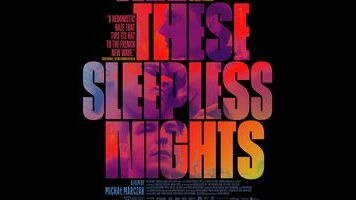Part of the problem is that one after-party looks much like another, so stringing a bunch of them together, interspersed with scenes of people walking empty streets, merely creates a kinetic blur. Michal Marczak, who’s credited as the film’s writer-director (more on that below), has neither fashioned nor stumbled upon much of a narrative, instead seeking to create the impression of a person “drowning in the present,” as Krzysztof puts it at one point. The characters play chicken with oncoming trains, dance to electronica, snort lines of coke, engage in philosophical discussions, and just generally look desperate to mask crippling uncertainty with live-for-the-moment hedonism. A tiny bit of conflict rears its head mid-film when Krzysztof hooks up with Eva (Eva Lebuef), the ex-girlfriend of his good buddy Michal (Michal Huszcza), but this mild betrayal doesn’t appear to even briefly elevate anybody’s heart rate—Michal lodges a half-hearted objection, calling Krzysztof self-absorbed, and that’s that. Back to walking and dancing.
All These Sleepless Nights had its world premiere at the 2016 Sundance Film Festival, where it was programmed in the World Cinema Documentary section (and won Marczak the section’s Best Director prize). Taxonomical debates about whether or not a film should qualify as a documentary tend to be unproductive, but it’s worth noting that few people would likely perceive this one as a doc without some extratextual assistance. Apart from the absence of any real story, it looks and feels entirely like fiction—indeed, it looks and feels a whole lot like Terrence Malick’s recent work and suffers from the same pinwheeling vagueness. All of the actors are reportedly playing themselves, but their performances, or presences, lack the enveloping texture of real-world humanity (as seen in, say, Frederick Wiseman’s documentaries) and the compensation of compelling drama. The movie constitutes one long, free-floating vibe, essentially, which may be more than sufficient for those viewers who are capable of fully surrendering to it. If, on the other hand, it sounds less than tempting to watch a compression of your college years restricted to times that you wondered why the hell you were still awake, consider yourself forewarned.


 Keep scrolling for more great stories from A.V. Club.
Keep scrolling for more great stories from A.V. Club.